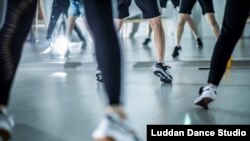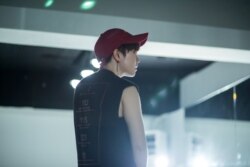Faced with discrimination and lacking support from their country’s leaders, some in South Korea’s LGBTQI community have found acceptance and protection in a place where they can express themselves without fear of judgement - and learn to dance like their favorite K-pop idols, too.
In an unmarked basement located beneath an indoor, virtual reality golf course, a class of 11 students rehearse choreography set to the song Mansae by the boyband Seventeen. As the music starts to blast from surround-sound speakers, the dancers snap into formation and then twist, shuffle and spin across the floor in front of wall-to-wall mirrors.
Kim Yu-jin, who opened the Luddan dance school four-years ago, bounces from student to student, correcting their moves while keeping up with the beat.
Kim and almost all of the studio’s 80 regular members identify as a gender or sexual minority; the 28-year old describes herself as queer and intersexual.
Kim says Luddan is where queer identity and feminism find common cause - both shun conventional ideals of how women should look and move their bodies.
“Instructors at other dance schools insult women about their body shape. They tell students to move their hips in a more feminine way,” she says. “Dancing shouldn’t be about gender and it’s not the place for a teacher to say what is or isn’t feminine.”
Kim says for South Korea’s LGBTQI community, Luddan is a “safe place” in a country that’s largely unsympathetic and is at times outright hostile to people like her.
In its 2019 “Society at a Glance” report, the Organization for Economic Cooperation and Development said South Korea is “lagging behind” other member nations regarding acceptance of homosexuality. And while South Korean government surveys suggest public perception of the LGBTQI community is improving, 49% of the 8,000 respondents in a 2018 poll still hold negative views.
Homosexual relationships carry a strong social stigma, but are not illegal, though soldiers in South Korea’s mainly conscript military can be punished or jailed for engaging in same-sex intercourse. And advocacy groups say LGBTQI youths experience a high rate of death by suicide and self-harm due in part to bullying and harassment.
Some observers say for these reasons, many Korean sexual or gender minorities keep their identities secret and participate in associations or clubs that are “off the radar.”
“Being outed in Korea as gay or lesbian can cause you to lose your job, or lose family support,” says Todd Henry, who lectures in modern Korean history at the University of California, San Diego.
Conservative Groups Demonstrate
He says the most vocal opposition to LGBTQI rights in South Korea comes from conservative groups; many with ties to Evangelical Christian churches.
These demonstrators hold rallies alongside Pride festivals and often outnumber the LGBTQI advocates.
In September, protestors in Incheon reportedly clashed with participants of a Pride parade and attempted to block the procession with their bodies. Some of the counter demonstrators held banners decrying homosexuality and shouted insults at the marchers.
And during a November festival in Changwon, a city some 300 kilometers south of Seoul, riot police separated roughly 3,000 protesters from several hundred LGBTQI-rights supporters, according to the Yonhap News Agency.
Kim Yu-jin says she experienced this kind of aggression at a Pride event in 2015 when she and other members of a queer dance team were assaulted by a protestor who pelted them with excrement.
“I was shocked and humiliated,” she says. “I grabbed as many water bottles as I could find to wash myself off.”
Todd Henry, who is also editor of the forthcoming book "Queer Korea", says this vocal and sometimes violent opposition to LGBTQI rights is a reaction to the “breakdown of the nuclear, heterosexual South Korean family.”
He explains the rise of LGBTQI activism in South Korea has coincided with other social phenomena, such as decreased birthrate, delayed marriage and increased immigration. And by opposing inclusion of this population, conservatives may believe they are preventing what they see as the further dissolution of traditional family values.
“Homophobia is one way for them to prove their self-worth at a time when Korea is rapidly changing,” says Henry.
He adds that this counter movement has political influence.
South Korean lawmakers have tried in vain to pass anti-discrimination legislation that would protect various disadvantaged groups, including people with disabilities, ethnic minorities as well as the LGBTQI community. Passage of such a law is widely viewed to have failed due to the objections of some National Assembly politicians who are against the inclusion of gender and sexual minorities in those bills.
In November, a conservative lawmaker called for preventing the National Human Rights Commission from investigating reports of sexual orientation-based discrimination, claiming that condoning homosexuality negatively influences youths and contributes to the spread of AIDS.
Amnesty International said in a statement that stripping the government affiliated watchdog group of this power would “leave LGBTI people in South Korea exposed to discrimination in all aspects of their lives and make them easy targets for abuse, threats and possibly violence, with no recourse to legal protection.”
And in a blow to supporters of marriage equality, South Korea’s progressive president, Moon Jae-In, reiterated his opposition to legalizing same-sex unions during a televised forum last month.
“I agree that there shouldn’t be any discrimination toward sexual minorities, but our society does not see a connection between this and allowing gay marriage,” Moon said in a response to a question from the audience.
Luddan’s Kim Yu-jin says she feels let down by the president and believes his remarks will embolden anti-LGBTQI groups to continue “voicing their hatred and discrimination.”
"Body Positivity"
She says without an all-encompassing human rights law, LGBTQI Koreans must rely on each other for support.
Some of her students say they’ve found that type of security at Luddan.
“I found a lot of safety and freedom here from social prejudice,” says a 28-year old man who goes by the nickname Dal Gilin. “I feel more positive now about myself and I discovered that my queer identity is linked with dance.”
“I couldn’t find any safe place to express myself,” says a 33-year old who asked to be called Mano.
She says she was body-shamed at other mainstream dance schools.
“I had a hard time accepting my body,” she says, adding that Luddan has helped her achieve a sense of “body positivity.”
As the K-pop song comes to an end, Kim tells the class to take a break- some out of breath dancers collapse to the studio floor.
She says while her students feel safe inside Luddan, she sometimes worries that those who want to prevent them from having rights will find their way down the basement stairs.
“I think about what I’d do if something bad were to happen here,” Kim says. “But I don’t feel helpless, I’m doing whatever I can to watch after this community.”





